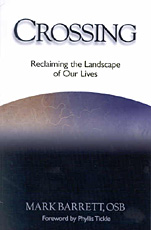Mark Barrett, a Benedictine monk for more than 20 years, is quite impressed with the way in which the aboriginals of Australia are able to read the landscape as a musical score containing the songs of their ancestors. He also has great respect for Dante's The Divine Comedy, which has tutored him in understanding the events of his own life symbolically. Both provide insights into the practice of locating "the action of God in the events and experiences of our lives, and to be more consciously aware of how we might identify and reclaim this landscape."
This erudite work is structured around the monastic liturgy of the hours. In Lauds, the morning office of praise as the sun rises, Barrett comes face-to-face with the reluctance to begin again. He discovers a wonderful feeling of "sifting and settling" in Vespers, as the day's activities accumulate and take shape and form.
Throughout Crossing Barrett offers pensive commentary on a variety of subjects, including the labyrinth, the stop signs in monastic life, lectio divina, commitment, and the spiritual art of "tincture and reflection" (a term he takes from the literary critic Christopher Ricks).
We were especially pleased with Barrett's interpretation of the scriptural story of the men on the road to Emmaus, his use of movies as illustrative material, and his reference to the attempts of the Desert Fathers never to judge in a harsh and unforgiving manner. He refers to the story of a wise man in the monastery who was asked what to do about the problem of those who fell asleep during common prayer. He replied, "If my brother falls asleep, I cradle his head in my lap." We can begin to reclaim the landscape of our lives by practicing compassion and cultivating an abiding concern for the well-being of others — even when they are vulnerable and flawed — just like us.
